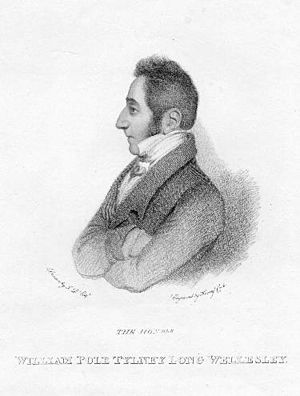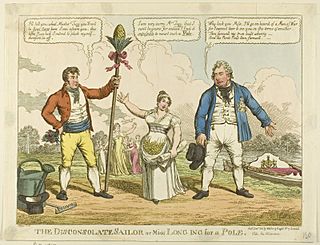William Pole-Tylney-Long-Wellesley, 4th Earl of Mornington facts for kids
Quick facts for kids
The Earl of Mornington
|
|
|---|---|

William Pole-Tylney-Long-Wellesley, c. 1812
|
|
| Member of Parliament for Essex | |
| In office 1831–1832 |
|
| Member of Parliament for St Ives | |
| In office 1830–1831 |
|
| Member of Parliament for Wiltshire | |
| In office 1818–1820 |
|
| Member of Parliament for St Ives | |
| In office 1812–1818 |
|
| Personal details | |
| Born |
William Wesley-Pole
22 June 1788 London, Great Britain |
| Died | 1 July 1857 (aged 69) Thayer Street, Manchester Square, London, UK |
| Political party | Tory/Ultra-Tory |
| Spouses |
Catherine Tylney Long
(m. 1812; died 1825)Helena Paterson Bligh
(m. 1828) |
| Profession | Politician |
William Pole-Tylney-Long-Wellesley, 4th Earl of Mornington (22 June 1788 – 1 July 1857) was an Anglo-Irish nobleman notorious for his dissipated lifestyle.
Early life
He was born William Wesley-Pole on 22 June 1788 in London and baptised at St George's, Hanover Square, on 19 July. His family, quite broadly defined, changed their surname to the more archaic 'Wellesley' in the early 1790s.
His first marriage was on 14 March 1812 to Catherine Tylney-Long, known in fashionable London society as "The Wiltshire Heiress", and believed to be the richest commoner in England. Two months before the ceremony William Wellesley-Pole assumed the additional surnames of Tylney-Long, changing his name by Royal Licence.
During this period William enjoyed a political career, first as a Tory Member of Parliament for the pocket borough of St Ives from 1812 until 1818, and then for Wiltshire, where his wife's family was influential. However, he was principally known for his dissipation and extravagance. On one occasion in 1814, Long-Wellesley held a grand fête in Wanstead House and its gardens to celebrate his uncle the Duke of Wellington's victory over Napoleon, attended by the Prince Regent, a number of other members of the royal family, and over a thousand dignitaries.
He was a friend of the Irish poet Thomas Moore and of Lord Byron. On 8 August 1822, as his debts began to mount, he was appointed a Gentleman Usher to King George IV, an appointment which rendered him immune to arrest for debt, but he was soon to leave England entirely.
Second marriage and custody battle
While in Europe evading his creditors, Long-Wellesley began a relationship with Helena Paterson Bligh (died 7 April 1869), the wife of Captain Thomas Bligh of the Coldstream Guards, eventually abandoning Catherine, who died two years later on 12 September 1825. ..... Long-Wellesley married Helena in 1828, but this marriage as quickly proved calamitous.
As a notorious rake he was unable to afford to make prudent investments in his first wife's property, but nor could he sell or mortgage it, having only a life interest in it (enjoying its income). As life tenant, he arranged with other beneficiaries for the demolition and carving up of Wanstead House's estate, the proceeds of which repaid some of his great debts.
He returned to Parliament in 1830, again as a member (MP) for St Ives. He was one of the Tories who broke with the first his uncle's Ministry and brought about its fall on 15 November 1830. He was returned and as a knight of the shire (MP) for Essex (in which lay Wanstead) from 1831 to 1832.
In the years following Catherine's death, he sought to regain control over his children, who were in the care of Catherine's two unmarried sisters, Dorothy and Emma. He was especially interested in William, the eldest, on whom Catherine's fortune had devolved. His uncle, the Duke, fighting one of his furious defensive actions, intervened on behalf of the children to keep the hapless William from his father.
Deprived of the custody of his children by the Court of Chancery, he was committed to the Fleet prison by Lord Brougham in July 1831 for contempt of court; Long-Wellesley invoked parliamentary privilege, but his plea was rejected by the committee of privileges of the House of Commons.
For some time he was in and out of court on charges of libel, and various other matters relating to his quest for custody of his children.
Decline and death
He led a very dissipated life and lived for a time in Brussels to avoid his creditors. In his last years, he lived on a small pension of £10 a week allowed by his cousin Arthur Wellesley, 2nd Duke of Wellington. From 1842 he was styled Viscount Wellesley, and succeeded his father as Earl of Mornington in 1845.
He died in lodgings in Thayer Street, Manchester Square, London, on 1 July 1857, from heart disease. The obituary notice three days later in the Morning Chronicle claimed that he was "A spendthrift, a profligate, and a gambler in his youth, he became debauched in his manhood... redeemed by no single virtue, adorned by no single grace, his life gone out even without a flicker of repentance". His coffin is in Catacomb B, Kensal Green Cemetery, London.


